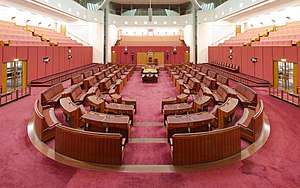Crossing the floor
In politics, a politician is said to cross the floor if they change their party allegiance. Crossing the floor may mean changing to a second party after being elected as a member of a first party, or voting against the approved party lines.

Voting against party lines may lead to consequences such as losing a position (e.g., as minister or a portfolio critic) or being ejected from the party caucus. While these practices are legally permissible in most countries, crossing the floor can lead to controversy and media attention. Some countries like India,[1] the Maldives and Bangladesh[2] have laws that remove a member from parliament due to floor-crossing.
Etymology
The term originates from the British House of Commons, which is configured with the Government and Opposition facing each other on rows of benches. In consequence, an MP who switches from the governing party to one in opposition (or vice versa) also changes which side of the chamber they sit on. A notable example of this is Winston Churchill, who crossed the floor from the Conservatives to the Liberals in 1904, later crossing back in 1924. The term has passed into general use in other Westminster parliamentary democracies even if many of these countries have semicircular or horseshoe-shaped debating chambers and mechanisms for voting without Members of Parliament leaving their seats.
Changing parties
In the United Kingdom and Canada, crossing the floor means leaving one's party entirely and joining another caucus. For example, leaving an opposition party to support the government (or vice versa), leaving or being expelled from the party one ran with at election and sitting as a clear[note 1] independent, or even leaving one opposition party to join another. In both countries, the term carries only this meaning, not simply voting against the party line on a bill.
In April 2006, Premier Gary Doer and leader the New Democratic Party of Manitoba proposed banning crossing the floor in the Manitoba legislature in response to "the concern some voters have expressed over the high-profile defections of three federal MPs from their parties in just over two years".[3] The resulting legislation, which amended the provincial Legislative Assembly Act, mandated that members of the legislature who quit (or are expelled from) their political party must serve out the remainder of their term as independents.[4]
An extraordinary example occurred in Alberta, Canada, in December 2014 by Danielle Smith, the Leader of the Official Opposition. She and eight of her MLAs, all of the Wildrose Party, crossed the floor together to join the governing Progressive Conservative Association of Alberta.[5] In 2019, eleven British MPs defected from the Conservative and Labour parties to form the centrist Change UK party. In September 2019, the governing Conservative party lost its working majority when Phillip Lee MP defected to the Liberal Democrats during the first speech of new prime minister Boris Johnson.[6]
Voting against party lines
In some countries, the phrase "crossing the floor" describes members of a government party or parties who defect by voting with the opposition against some piece of government-sponsored legislation. Political parties commonly allow their members a free vote on some matters of personal conscience. In Australia, one of the major parties, the Australian Labor Party requires its members to pledge their support for the collective decisions of the caucus,[7] which theoretically prohibits them from "crossing the floor" in this sense; however, in practice, some Labor members disregard this pledge, despite the disciplinary action which may result. Among other parties, crossing the floor is rare, although then Senator Barnaby Joyce of the National Party of Australia crossed the floor 19 times under the Howard coalition government.[8] Tasmanian Senator Sir Reg Wright, voted against his own party, the Liberal Party of Australia, on 150 occasions, which has been claimed as a record for this form of crossing the floor in the Australian Parliament.
See also
- Aaya Ram Gaya Ram, a term used in India for party-switching politicians
- Aisle (political term)
- Conscience vote
- Crossover voting
- Floor crossing (South Africa)
- List of British politicians who have crossed the floor
- List of Canadian politicians who have crossed the floor
- List of United States Representatives who switched parties
- List of United States senators who switched parties
- Party switching for a similar concept
- Trasformismo for a similar concept in Italy
- Waka-jumping
- Whip (politics), in UK politics voting against the party line is known as "defying the whip"
Notes
- Independents are MPs who are not members of any party recognized in the House, which may happen for a range of reasons. The House may have a minimum threshold caucus size for party recognition (distinct from the Electoral oversight body), so if only one or two politicians are elected from a minor party their party is not accorded status and they are treated as independents. Another reason could relate to e.g. the death of a party’s candidate after ballots were printed but before polling began, so alternate candidate runs independently but pledging to "take the whip" of party X. These examples are not "clearly" independent MPs, unlike someone who resigns from party Y declaring they can no longer in principle remain with it, or someone who ran and was elected on a platform against all the existing parties.
References
- Venkatesan, J. (2010-10-12). "What the Anti-Defection Law says". The Hindu. ISSN 0971-751X. Retrieved 2019-03-27.
- "Article 70(b) of Constitution of People's Republic of Bangladesh".
- Macafee, Michelle (April 11, 2006). "Proposed reforms would ban floor-crossing in Man". Canadian Press. Archived from the original on March 23, 2007.
- "The Elections Reform Act - Schedule E". Statutes of Manitoba. Manitoba Laws. 2006.
- http://globalnews.ca/news/1737886/danielle-smiths-move-to-pcs-unprecedented/
- "Tory MP defects ahead of crucial Brexit vote". 2019-09-03. Retrieved 2019-09-04.
- "Crossing the floor in the Federal Parliament 1950 – August 2004". Research Note no. 11 2005–06. Australian Parliament. October 10, 2005.
- Penelope Debelle, Independently inclined in The Age dated May 31, 2008, p. 2